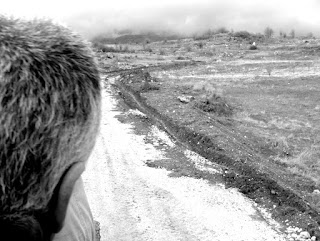From the 10-13th
September this year there will be a fair in London
Over 25000 people will visit the fair, from dozens of countries.
What kind of a fair could
attract such visitors?
Will there be carousels,
candy floss, coconut shies?
No.
This fair is one of a
different kind.
You see, once every 2 years the DSEi (Defence & Security Equipment International) Arms Fair happens at Londond ExCel centre. It is the world’s largest arms fair, allowing arms buyers and sellers to network and make deals.
Arms dealers from all over the world, from the worlds richest to the
worlds poorest states, are invited to come together, network and make deals.
Weapons are sold to countries at war with each other. Small
arms, battleships, missiles, tanks, fighter jets, riot control equipment and
more are all on offer. Some are sold to regimes that attack their neighbours or
oppress and kill their own peoples. In previous years, fearless activists have
found banned equipment such as torture devices and cluster bombs for sale.
Countries that are involved
in humanitarian crises and human rights abuses are offered space, alongside
delegations from countries who need aid to provide their people with education,
healthcare and economic stability, but are invited to use their metaphorical
credit cards in this store of horrors.
And, as if all of that isn’t
scary enough, DSEi is subsidised by the British taxpayer.
British weapons are
demonstrated to foreign buyers by soldiers provided by the Ministry of Defence.
The event is co-organised by
the UKTI’s Defence and Security organisation, which
helps British arms companies to make invites, export deals and also hosts
guests.
And, at a cost of over £4
million The Metropolitan Police provide security for the event.
It all makes me sick.
It makes me sick because it
reeks of everything that needs changing in this world.
It makes me sick because I
am told that the Kingdom
of God
It makes me sick because I
have shared table and broken bread with friends who have seen little ones blown
up before their eyes by cluster ‘bomblets’ which look like toys to the eyes of
small people who, despite their lands being ravaged, still live in hope of
wonder and joy.
Photo by Khristo Newall
It makes me sick because I
still have vivid recollection of heading up into the mountains bordering Iran
The air is crisp and
mountain fresh but the ground is deadly and land-mined.
This track is all that is
safe to walk on.
He shows us around the small
areas of safety, showing us spent mines and safe places to walk, telling us
tales of brothers blown up by these insidious hidden killers.
There are jokes told around
the fire. The men find it hilarious when
a couple of us wonder about how to navigate our way in the pitch mountain
darkness through the treacherous land to the long-drop-toilet at the back of
the hut. They find it even more
hilarious to sneak outside at break of dawn and wake us up to the sound of them
shooting at rocks outside the hut with their rifle, declaring that the Iranian
shelling has begun early. The humour of
a land in turmoil I guess.
But, around that fire and
amongst the broken bread and sweetened tea, bonds were forged and truths were
spoken.
It makes me sick because I
have stood in the graveyards of Halabja and heard the stories of families
choking on the poisoned air, gasping for survival.
I have seen their faces and
heard their stories and loved them for but a moment.
This stuff is real.
And in September this year the
weapons that cause such destruction will be pedalled on our doorstep.
And we must stop it.
We might not change their
hearts, but we can make it harder for them to walk through those doors without
having to face the reality of their trade.
We can look at their badges
and learn their names and speak to them of other people who also have
names. Of Kaka Mahmoud and his sons, of
little ones who once played in desert sands with their toys of destruction.
‘All it takes for evil to
prosper is for a good person to do nothing.’
So, we should do something.
Go here:
or here:
or here:
to find out more.
Because there are names and
stories and families and hopes and dreams at stake.
It is real.










No comments:
Post a Comment